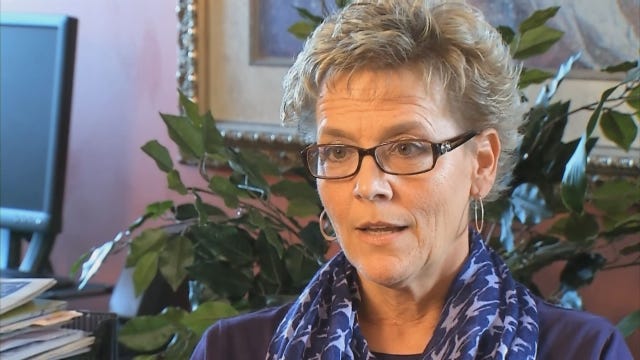Crime And Punishment: The Debate Surrounding Embezzlement In Oklahoma
Embezzlement is an increasingly common crime. According to one recent report, cases of embezzlement jumped, nationally, more than ten percent from 2011 to 2012.Tuesday, November 19th 2013, 6:24 pm
Under other circumstances, the theft of $215 million might well generate national headlines and go down in criminal infamy. But when the crime is embezzlement, and the money is stolen over a period of 20 years (and it happens in Iowa, as this did,) it just doesn't get the same amount of attention.
Maybe it should.
The truth is, embezzlement is an increasingly common crime. According to a report published earlier this year by Marquet International, cases of embezzlement jumped, nationally, more than ten percent from 2011 to 2012.
On News 9, there were four times as many stories on embezzlement in 2012 as there were in 2009. Also, the Marquet report lists Oklahoma as the 11th most likely state for a major embezzlement case.
There are many people who can attest to that.
"I kind of felt like somebody punched me in the stomach," said Jan Peery, CEO of the YWCA Oklahoma City.
In January, 2013, Peery learned that the YWCA, a non-profit that advocates and provides shelter for women who are victims of domestic abuse, had itself become a victim -- of embezzlement. For Peery, it was, unfortunately, just the latest in a series of life's challenges.
Peery's son, Chad, is the Oklahoma City police officer who, in 2011, was paralyzed in an off-duty incident in which he was helping the owner of a local bar remove a group of drunk and unruly patrons. The father of four overcame significant odds in regaining limited movement, his job, and some semblance of his former life, only to be killed in a auto wreck last April.
4/15/2013 Related Story: Family, Friends Remember Officer Chad Peery Who Died Following Crash
As numb as she already was from her family's strife, Jan Peery says, the realization that a trusted YWCA employee had been stealing from the organization -- and thus undermining their mission -- still hurt a great deal.
"Ya know, if somebody -- a stranger -- had beat me up," Peery explained, "I'm not sure I would have felt any more traumatized."
According to court documents, the employee, Shannon Rickards, the YWCA's chief financial officer, used her access to the nonprofit's bank cards to steal $280,000 between October 2010 and January 2013.
Peery says, between the actual funds taken, and legal costs, the damage is closer to $400,000.
"Knowing what those dollars do -- they help us to provide crisis services for victims -- and then to turn around and know that we've now been victimized by crime," Peery sighed. "It was all...quite a journey."
The specific circumstances surrounding Peery's embezzlement nightmare may be unique, but her resulting shock is not.
"You do see a lot of those cases," said attorney Scott Palk. "Where victims are absolutely stunned."
Palk is a former state and federal prosecutor, and now assistant dean at the University of Oklahoma School of Law. Palk says what happened at the YWCA, and, more generally, the increased prevalence of embezzlement , doesn't surprise him in the least.
"In tougher economic times," Palk stated. "You see an increase in embezzlement."
On that point, the authors of the Marquet paper agree, writing, the increase "may be the result of the fact that many of the embezzlement cases in the report began immediately after the economic collapse in late 2008."
"It's a need to maintain that level of income," Palk said. "And it's just too easy when you're handling someone else's money."
Other recent victims of embezzlement include Oklahoma City Community College, Oklahoma City University, and Tulsa public schools.
Peery, who's done her own research on the subject, says there are many more, but most victims choose not to speak out, as she is.
"And their reason," Peery stated. "Was because they didn't expect that anything would be done."
Sentences for those convicted of embezzlement can be harsh. The former director of the state CASA (Court Appointed Special Advocates) Association, Anna Naukam, was sentenced to 15 years for embezzling $650,000.
But more common are cases like that of Bill Coyle, who was sentenced to 90 days in jail and 500 hours of community service for embezzling $58,000 from St. John the Baptist Church in Edmond.
Palk says, plea deals are often struck -- at the victim's request -- to minimize the offender's time in prison.
"While they're incarcerated," said Palk. "They're not paying back the money, the restitution, in any meaningful sense."
Peery says she wants to be paid back, but she feels it's more important to send a strong message that embezzlement is a serious offense.
"There needs to be some kind of justice," Peery said. "And just paying us back the money -- that'll give us the money we need and help us move on...but we need to have to justice."
Peery says embezzlement may not be a violent crime, but it's a crime with many, many victims. In her case, there are the 80 employees of the YWCA, and then all the battered women they could have helped with $400,000.
You can see extended excerpts from our interview with Jan Peery in the video player above.
More Like This
November 19th, 2013
April 30th, 2025
Top Headlines
 The last dance? Organizers of North America’s largest powwow say 2026 will be the event’s final year
The last dance? Organizers of North America’s largest powwow say 2026 will be the event’s final year
August 16th, 2025
August 16th, 2025
August 16th, 2025
August 16th, 2025












